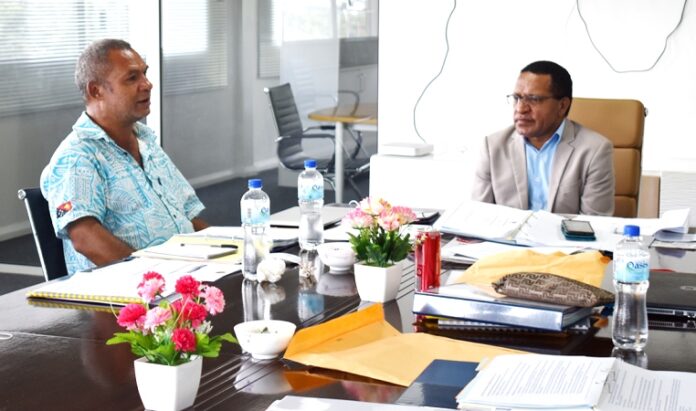
THE Papua New Guinea National Research Institute (PNG NRI) was honored to have the new Minster for Higher Education, Research, Science and Technology and Sports, Wesley Raminai visit the campus recently.
Mr Raminai joined the PNG NRI Council Acting Chairman, Wilson Thompson and members of the PNG NRI Council during its first meeting of the year, where he was briefed on the Institute’s roles, responsibilities, functions and key activities.
While congratulating Mr Raminai on his recent appointment, Mr Thompson briefed him on the PNG Knowledge Hub Precinct development and on how the PNG NRI is positioning itself in supporting the Marape-Basil Government going forward.
“The Institute’s research is organised under eight Research Programs, conducting research aimed at addressing the key economic and social issues facing PNG, as envisioned in the PNG Vision 2050; Development Strategic Plan (DSP), 2010- 2030; the Medium-Term Development Plans (MTDPs); and other relevant and topical development issues,” Mr Thompson said.
He said in addition to providing advice on better public policy outcomes and improved service delivery, the PNG NRI research team is also engaged in policy development and analysis in collaboration with key government agencies. For example, the recently held National Land Summit in 2019 with Department of Lands and Physical Planning; Department of National Planning and Monitoring; and Department of Treasury. A key contribution of the PNG NRI to public policy analysis has been the offering of the popular annual Economic Policy Analysis Course (EPAC) since 1989.
Mr Thompson assured the Minister that the Institute remains focused and would ensure its work addresses PNG’s long-term development challenges.
He said the focus for the next three years is captured in the Institute’s new 2021-2023 Corporate Plan, which is intended to synchronise with the government’s planning period; that is completion of the current MTDP in 2022 and commencement of the new MTDP in 2023. A new Corporate Plan will be developed to synchronise with the new MTDP going forward.
“The Council sees the importance of the Institute in aligning its plan with the term of each successive government. In this manner, we become more responsive to the priorities of the government of the day and to align our research accordingly and provide solutions to problems as they arise,” he said.
Mr Raminai assured the Council that he would support the work of the Institute during his term. He took on board the challenges faced by the Institute in terms of staffing and budget cuts.
